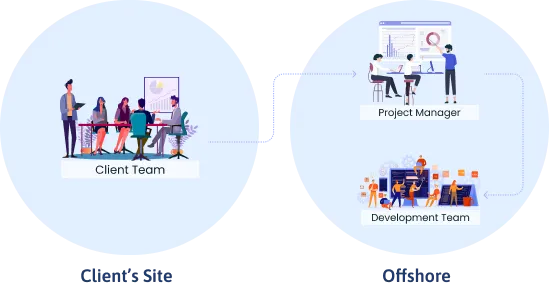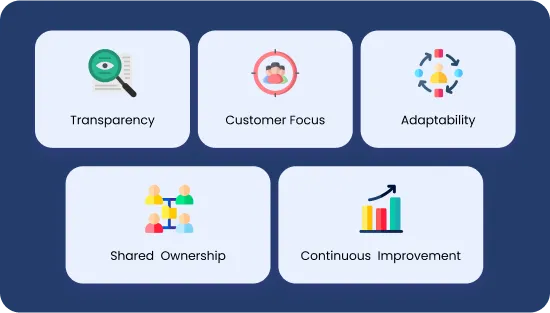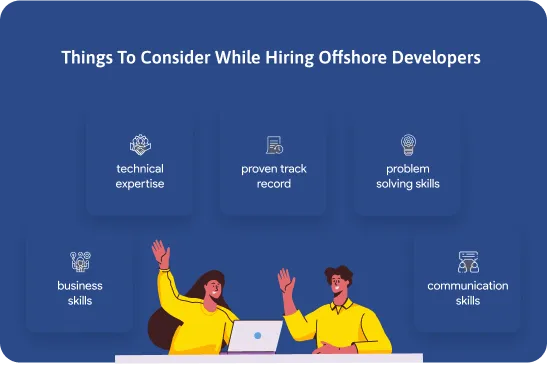Carrying out software development in a foreign country halfway across the globe, and entrusting important projects to unknown individuals, sounded crazy not long ago. But a few businesses attempted it and they struck gold. Most of us would never have imagined that developing economies such as India, China, and the Philippines would be a gold mine for some of the world’s most successful countries. It all started as an experiment and then turned into one of the most popular practices in software development.
Offshore software development gives access to cheaper yet effective solutions from areas of the world where operating costs are much lower than in the west. This is because labor rates in countries like India and China are much lower than in developed countries. Offshore development also gives companies access to a global talent pool. This is especially beneficial for businesses with limited resources or those that need to quickly ramp up their development capacity.
But, it’s not that easy. There are many things involved in making this lucrative and viable operation a success. This whitepaper will discuss these issues and present their solution to you understandably.
Evolution Of Offshore Software Development
The concept of offshore software development originated in the early days of computing when companies would contract out work to programmers in India and other countries to take advantage of lower labor costs. However, this practice was not widely adopted until the 1990s, when advances in telecommunications technology made it possible for companies to collaborate with service providers located around the world.
At that time, developed countries were a relatively untapped resources for software development, and companies were able to get quality work at a fraction of the cost of hiring programmers in the United States.
Today, offshore software development is a popular way for companies to cut costs and improve efficiency. By outsourcing work to a low-cost provider, businesses can save money on wages and benefits while still maintaining control over quality.
Offshore software development has continued to grow in popularity as more and more companies realize the potential cost savings. Additionally, many offshore development firms have worked hard to improve their quality and customer service, making them a more attractive option for businesses.
Transform your business with ValueCoders' reliable and cost-effective offshore software services.
Reputed global companies such as Intel, American Express, Aetna, U.S. Healthcare, Compaq, General Motors, Home Depot, IBM, Microsoft, Motorola Shell, and 3M have set up their own offshore software development centers or entered strategic alliances with off shore software companies.
Offshore Resources Hiring Models
Offshore outsourcing, often shortened as just outsourcing, is when a company moves its business process to a country that is not geographically located nearby.
Team Augmentation
The primary offshore resources hiring model is the team augmentation model. This model involves bringing on contractors for only a specific amount of time and often for just a specific project or tasks that are needed to be done.
To effectively execute the team augmentation hiring strategy, employers should look for individuals with skill sets that are well suited for their needs, but not necessarily any resources who possess in-depth knowledge of the business or industry they’re working within. This ensures they’ll have the flexibility they need when it comes time to move on from their contracting employees.
Onsite/Offshore
The onsite/offshore model is a way of organizing work in which some tasks are performed on-site, while others are performed off-site.
The work is first divided into two categories: tasks that can be performed on-site, and tasks that must be performed off-site. On-site work is typically done by employees of the company itself, while off-site work is subcontracted to another firm.
This arrangement can offer several advantages
- First, it can save money. Employees working on-site usually cost more than those working off-site, so by outsourcing some tasks, companies can reduce their labor costs.
- Second, it gives organizations the ability to tap into a global pool of talent. This can be especially beneficial for companies that cannot find the talent they need locally.
- Finally, it leads to improved efficiency and productivity by leveraging the best practices of both onshore and offshore.
Pure Offshore
The term “pure offshore model” refers to a business arrangement in which all aspects of the work are carried out offshore, with no onshore involvement. In this type of arrangement, a company contracts with another company (or individual) to have certain work tasks performed by the second company (or individual). The key characteristic of an offshore model is that the work is contracted to be performed outside of the contracting party’s home country.
One example of a company that employs a pure offshore model is ValueCoders, an Indian IT services company. ValueCoders offers its services to clients around the world, but all of its operations are based in India. This allows the company to take advantage of lower labor costs in India while still being able to serve clients in developed markets.
There are several advantages that can come from using a pure offshore model. First, it can save businesses a significant amount of money, as they don’t need to pay for onshore talent or resources. Second, it can help businesses tap into global expertise and perspectives, as they’re not limited to working with an onshore team. And third, it allows businesses to move faster with faster turnaround times.
Offsite/Offshore
The offsite/offshore model involves having your company’s software written by a team of programmers who work from home or in a remote office location.
It has two main benefits over onsite employment models: lower overhead costs (no physical offices or large teams of employees) and speedier development times (some firms report 2-3x faster product time-to-market).
However, offsite work comes with its own set of risks, which includes difficulties in communication, language barriers, and sometimes fraud. Because of these risks, some companies choose to hire firms that are regulated by either local government or industry associations. If you decide offshore is right for your business or project needs, we recommend finding an expert advisor before entering any agreement.
Why You Should Go For Offshore Resources Hiring?
You should go for offshore resources hiring if you’re trying to get your business started up quickly and efficiently. The offshore model can be extremely cost-effective since you won’t have to worry about covering any overhead costs associated with setting up an in-house team. This type of arrangement also helps improve communication and collaboration between your teams, since they’ll no longer be working in silos.
And finally, if you choose to work with a reputable offshore partner like ValueCoders you can be confident that your project will be in expert hands. Below mentioned are a few reasons you should go for offshore resources hiring.
Also Read – Setting up a Dedicated Offshore Development Center: The Basic Principles
High Cost Of Local Developers And State Compliance
Hiring local developers turns out to be more expensive for companies than offshore developers. There are multiple reasons that work behind this.
For one, the cost of living in developed countries is higher than in developing countries. This means that developers in developed countries will need to earn higher salaries just to maintain their standard of living.
Developed countries often have stricter laws and regulations around employment, including things like minimum wage laws and employee benefits. This can add significant costs to hiring local developers compared to hiring offshore developers who may not be subject to the same laws and regulations.
Finally, developed countries have a more sophisticated and complex economy, so businesses operating in these countries will need more expensive developers with more specialized skill sets.
A Dearth Of The Required Skill Set
A lack of the required skillset locally can make businesses look to hire offshore developers. For example, if a business needs a software developer with expertise in a certain programming language that is not widely taught in the United States, they may have to look overseas for a developer who is fluent in that language.
One main reason is that the demand for developers with specific skills continues to grow, while the number of domestic candidates possessing these skills remains relatively static. And when you factor in the high cost of salaries and benefits for developers in the U.S., it becomes clear why so many companies are turning to outsourcing as a viable option.
Many offshore developers are willing to work for less money than their on-shore counterparts, which can save business money in the long run. Outsourcing development work in countries like India or Russia can be up to 50 percent cheaper than hiring domestically.
Unable To Scale And Expand Business Offerings
Businesses often turn to offshore developer hiring in order to expand their business offerings. By working with developers in other countries, a business can gain access to new technologies, programming languages, and software that they may not have otherwise had access to.
By working with an offshore development team, a business can often save money on labor costs. This is because the cost of living and doing business in certain parts of the world is much lower than it is in North America or Europe.
Offshore developer hiring can help businesses scale their operations by giving them access to a wider pool of talent at a lower cost.
High Infrastructure Cost
Offshore developer hiring can help reduce infrastructure costs in a few ways.
First, by outsourcing development work to a lower-cost country, businesses can often save money on the salaries of the developers who will work on your project.
By using an offshore development team, businesses may reduce or eliminate the need for certain types of infrastructure and support staff in their own office. This can include anything from dedicated server space and IT support to administrative and HR staff.
Finally, offshoring also helps take advantage of new technology that would otherwise be too expensive or difficult to implement in the office. By working with a development team that is already using the latest tools and technologies, you can avoid the extra cost of introducing them into the system.
How To Integrate The Offshore Resources With Your Organization
There are a few different ways to integrate offshore resources with your organization:
There are a few ways agile can help remote teams integrate offshore developers.
By using an agile framework, you can ensure that everyone is always on the same page, which eliminates any miscommunications or misunderstandings.
Using agile allows for more frequent communication and collaboration between team members, both in-office and offshore. This builds better working relationships and helps ensure that all team members agree development-wise.
Finally, using agile also enables tracking progress more closely and identifying potential roadblocks or issues sooner rather than later. This allows for rapid course corrections and keeps the project on track. Overall, agile can be a great tool for managing remote teams – including those with offshore developers.
Using Tools To Manage Remote Teams
There are several tools out there that can help you manage and integrate an offshore developer into your team. For example, tools like Trello or Asana can help you keep track of tasks and projects, and enable remote communication between team members. Skype or Slack can be used for messaging and file sharing and tools like Google Hangouts or Zoom can be used for video conferencing.
The key is to find the right tools that work for your team and your project, and then to make sure everyone is familiar with how to use them. By using a variety of tools for communication and collaboration, you can create a smooth workflow for your entire team – both on-site and offshore.
Project Management Tools
Project management tools are software applications that help you plan, track, and report on your projects. They can communicate project information to team members, manage project tasks and deadlines, and control costs. Some popular project management tools include Microsoft Project, Basecamp, and Trello.
Project management tools can be extremely helpful in managing complex projects with many moving parts. They can help you keep track of what needs to be done, when it needs to be done, and who is responsible for each task. They can also help you identify potential risks or issues and track progress.
There are a variety of project management tools available to help you plan, track, and execute projects. Here are a few popular options:
Trello is a web-based project management tool that uses Kanban-style boards to visually aid in task management. It’s great for small projects with a few team members.
Asana is a web and mobile application that allows users to create and manage tasks and projects. It offers features such as Gantt charts and integration with third-party apps. Asana is better suited for larger projects with more complex workflows.
Basecamp is another web-based project management tool that focuses on simplifying communication
Productivity Management Tools
Productivity management is a process that helps you and your team identify areas where productivity can be improved, set goals and objectives for improving productivity, and track progress. Productivity management can be divided into project management, time management, and task management.
Project management software is helpful for people who need to track deadlines and deliverables for work or personal projects. Examples of project management software include Trello, Asana, and Basecamp.
Time tracking apps can keep track of how long you spend on specific tasks so that you can better measure your productivity. Time tracking apps like Workstatus, Toggl, and RescueTime can be used for this purpose.
Task management apps are tools that help keep track of your to-do list and manage your time more efficiently. There are a lot of different task management apps out there, and they all have distinct features. Some popular task management apps include Todoist, Wunderlist, and Asana.
There are several productivity management tools available today, each designed to help with different aspects of the task management process. Some of the most popular options include Workstatus, Trello, and Basecamp.
Transform your business with ValueCoders' reliable and cost-effective offshore software services.
Communication Tools
The best way to integrate offshore developers into your company is to use communication tools that allow for collaboration and transparency. Some great tools for this include Slack, Google Hangouts, and Trello. These platforms allow for easy messaging and sharing of files, which makes it easy for developers to stay in touch and work together on projects. Having a continuous flow of communication is key to keeping offshore developers integrated into your company culture.
There are several communication tools to integrate the offshore developers in an organization. The most common ones are email, chat, and video conferencing.
Email is the most basic and commonly used tool for communication between organizations. It is quick and easy to use, and can send messages to multiple people at once.
Chat is another common communication tool, which can be used for real-time conversations between two or more people. We often use it for shorter conversations than email, and can be a more informal way of communicating.
Video conferencing is a tool that allows two or more people to communicate via webcam. This can be useful for meetings or presentations.
Hurdles to Overcome In Hiring Offshore Resources
There are many potential hurdles that companies must overcome when hiring offshore resources. These can include language barriers, cultural differences, time zone differences, and communication difficulties.
Companies must ensure that their employees are legally allowed to work in the country where they will be based and that they have the visas and work permits. Finally, companies need to evaluate the cost-benefit of hiring offshore resources, as these employees may require higher wages than local employees.
Country Related Hurdles
The top three country related hurdles that companies face when looking to hire offshore developers are cultural differences, communication barriers, and time-zone differences.
Cultural Differences: It’s difficult to find a developer who is culturally compatible with your company.
Communication Barriers: The language barrier can be a major obstacle when trying to communicate with potential developers.
Time-Zone Differences: It’s difficult to coordinate meeting times and communicate effectively across different time zones.
There are several ways to overcome these hurdles:
- Cultural Compatibility: Look for a development firm that has cultural values that are aligned with your company’s values.
- Communication Tools: Use online communication tools such as chat, video conferencing, and project management software to help
- Different Time Zones: Setting a work schedule in which all team members can participate.
Firm Related Issues
- False claims of companies for their developers
Many firms claim to have experience in various technologies, but it’s found out they’re all just fake.
- How to overcome such issues?
There’s no substitute for looking at the actual work when assessing programming abilities, project management skills, or written English command. A development organization in any nation should be proud to exhibit prospective customers’ samples of their work and internal processes to potential clients.
- Lack of direct control
The outsourcing firm lacks direct control over the offshore team. As a result, constant oversight of the job will be impossible, as opposed to internal development.
- How to overcome this problem?
Appoint a senior executive to handle all phases of outsourcing. In remote outsourcing, developing a long-term relationship with the vendor is critical. If there’s only one point of contact within the firm, trust levels rise.
Transform your business with ValueCoders' reliable and cost-effective offshore software services.
Team Related Problems
Lack of understanding by offshore employees
How to overcome this problem?
Having an onsite coordinator makes it easier for the client and the offshore team to communicate. The onsite coordinator ensures that the offshore team clearly understands the customer’s demands. He acts as a go-between, ensuring that any language or cultural gaps are bridged.
Misunderstandings And Poor Documentation Due To Different Native Language
English is an official language in India, Ireland, and a few other well-known offshore nations. You may count on a strong understanding of idiomatic English in those nations. In other areas, you must ensure that there is mutual communication.
Maximizing the ROI With Offshore Resources
If you are looking to maximize the ROI with the offshore resources, there are a few things to keep in mind:
- Make sure you are taking advantage of the cost savings offered by offshore resources. Outsourcing lower-level tasks or processes that don’t require a high level of expertise can often do this.
- Use only the correct resources for the job. Not all offshore resources are equal, and you may find that certain countries or regions offer a higher quality of labor at a lower cost. Do your research and make sure you are getting the most bang for your buck.
- Establish good communication channels with your offshore team and make sure everyone is on the same page.
- Make sure you have a clear and well-defined project roadmap. This will help ensure everyone agrees and understands the goals of the project.
- Establish clear expectations for what each team handles. This will help avoid any confusion or miscommunication between teams.
- Clearly define deadlines and make sure everyone is aware of them. This will help ensure that projects stay on track and don’t get delayed unnecessarily.
- Compare the cost of labor in your country with the cost of labor in other countries. If the cost of labor is much lower in another country, it may be more cost-effective to outsource work to that country.
- Evaluate the quality of work that you can expect from offshore resources. If you can find a provider who offers high-quality work at a cheap price, it may be worth outsourcing work to that provider.
Top Technologies For Which Companies Prefer Offshore Resources Hiring
There are a number of popular software technologies for which companies often prefer to hire offshore developers. Some of the most common technologies include:
- Cloud computing technologies
- Cross-platform and hybrid deployment
- Processes build under Angular, React, NodeJS
- Big data computation
- Mobile app development
- Web development
Ways to Identify the Best Company for Offshore Hiring
There are a few ways to identify the best company for offshore resources hiring
Communication and Coordination
Ensure that there is clear and effective communication between the in-house team and the offshore developers. This includes clearly communicating your expectations, goals, and feedback. There should also be a system in place for regular updates and progress reports.
Coordination is another important factor. There should be a clear process for how work will be assigned, how deadlines will be set, and how issues will be resolved. This can help prevent misunderstandings and potential scope creep.
Outsourcing Rates
For starters, it’s important to understand the point of outsourcing rates. When you outsource your development work, you’re essentially paying someone else to do the work for you at a lower cost. This can be a great way to save money on your project, but it’s important to make sure that you’re comparing apples to apples when assessing different quotes.
When looking to outsource your development, it’s important to compare pricing models and find the one that best suits your needs. Typically, you can choose between two different models:
- Pay Per-Hour Rate – This is the most common model, where you pay a developer an hourly rate for their time. This can be a good option if you need a lot of flexibility or if you’re unsure of how much work will be required. It can also be more expensive in the long run if you go over your budget.
- Pay for Milestones – With this model, you pay for specific milestones rather than hours worked. This can be more cost-effective in the long run.
Project Management
The best company for offshore developer hiring like ValueCoders will have a robust project management process in place. This process should include requirements gathering, design, development, testing, and deployment. By having a well-defined project management process in place, the company can ensure that the developers they hire are working on the correct tasks and that it keeps all stakeholders informed of progress.
When looking for a company to hire offshore developers, it’s important to find one that has a good project management system in place. This way, you’ll be able to track the progress of your project and ensure that it’s on schedule.
Project management is essential for ensuring that your project completes on time, within budget, and to your specifications. A good project manager will work with you to create a detailed plan for your project and will then ensure that we complete all aspects of the project on time and within budget.
Some things to look for in a company’s project management system include:
– Clear communication channels between the client and developer team
– Frequent status updates from the developers so you know what’s been accomplished and what still needs to be done
– Proper documentation of all tasks and procedures, so there is no confusion about what needs to be done or how it should be done
– Clearly defined roles and responsibilities for everyone involved in the project
Transform your business with ValueCoders' reliable and cost-effective offshore software services.
Size of Organization
It can be difficult to identify the best company for offshore hiring, as there are many factors to consider. One important factor to consider is the size of the organization.
Offshore outsourcing can be a great way to save money and improve efficiency, but it’s important to work with a company that has the resources and infrastructure in place to handle your project. A large, well-established company will have more experience and expertise in offshore outsourcing than a smaller company. They will also have the bandwidth to take on additional projects without compromising quality or service.
If you’re looking for a reliable partner for offshore hiring, look for a company with a proven track record and extensive experience in the industry.
Smaller companies may be more affordable, but they may not have as much experience or resources in place for offshore hiring. It’s important to do your research before deciding and to ask plenty of questions to make sure you’re finding the best fit for your needs.
Availability Of Skilled Resources And Expertise
For the availability of skilled resources, it is important to consider both the current skill set of the developers you are considering and also their future potential. Regarding expertise, you will want to evaluate developers on their experience and track record. In both cases, it is important to hire developers who can show they have the right skill set and experience for your project.
The best way to identify the best company for offshore developer hiring is therefore to talk to several companies and ask them about their developers’ skillsets and experience.
Here are a few tips for finding the best company for offshore developer hiring:
- Look for a company with a strong portfolio of work. This will give you a good indication of their level of expertise and skill.
- Make sure they have experience working with clients in your domain.
IP and Data Security
To hire an offshore developer, it’s important to identify a company that will provide you with the best possible IP and data security. Here are a few factors to consider when making your decision:
- Make sure the company has a robust IP and data security protocol in place. Offshore companies should have clearly defined procedures for handling confidential information. These procedures should be regularly reviewed and updated in response to changes in technology and data security threats.
- Choose a company that is in a country with laws that protect your intellectual property rights. Countries such as the United States, Canada, and Australia have laws that offer powerful protection for intellectual property.
- The company’s staff should be fully trained in data security best practices and regularly updated on new threats and vulnerabilities.
By taking the time to research potential providers, you can ensure that your intellectual property and sensitive data are well-protected.
Transform your business with ValueCoders' reliable and cost-effective offshore software services.
Project Delivery Approach
The Project Delivery Approach is defined as the way in which a project intended to create or deliver a product, service or result is managed and undertaken by an organization. It includes multiple contractual agreements between a variety of stakeholders, including designers, manufacturers, suppliers, customers and end users. There are three main types of Project Delivery Approaches: Agile,Iterative, and Waterfall.
Knowledge Retention Approach
This approach ensures that the developer has a good understanding of your company’s unique knowledge domain and can apply it to his work. Without this approach, developers may not be able to properly adapt their skills and experience to your company’s needs.
The best way to find out if a developer has a good understanding of the Knowledge Retention Approach is to ask them about it during the interview process. If they’re able to explain it clearly and show how they would use it in their work, then you can be confident that they’ll be able to do a great job for your company.
The knowledge retention approach is based on ensuring that crucial project requirements and details are accurately conveyed to, and understood by, the team carrying out the work. To do this, an organization or individual first needs to understand what needs to be accomplished. They will also need to have excellent communication skills in order to explain the project requirements to those who will work on it.
How ValueCoders Makes The Best Company For Offshore Hiring?
ValueCoders makes the best company for offshore hiring as we satisfy all these requirements as mentioned below:
- We have a rigorous selection process and only choose the best developers for the process.
- We provide complete transparency to our clients with regards to the developers’ skill sets, hourly rates, and project progress reports.
- We have a team of dedicated project managers who ensure that projects are completed on time and within budget.
- Our developers are experts in a range of technologies, including Java, .NET, PHP, iOS, Android, and Ruby on Rails.
- We offer a 100% satisfaction guarantee or your money back.
Conclusion
Hiring offshore resources is not only cheaper but also fast. There is always someone out there who knows exactly what your business needs in terms of technology, culture, and skill level. Outsourcing allows businesses to save money on labor costs while getting high-quality results quickly.
The advantages of offshore software development outweigh the drawbacks. It may have a significant impact on your software development process.
You can make your offshore projects a success if you take the precautions. Here are some key pointers to get you started:
- Find a good partner with a track record of offshore projects over several years.
- Decide on appropriate options. Send a test project to the offshore firm and assess the result.
- Establish a long-term alliance.
- Visit your development partner to know them better and develop relationship.
- Establish sound management practices from the start.
Offshore development is successful in the long term, not for one-time projects.












